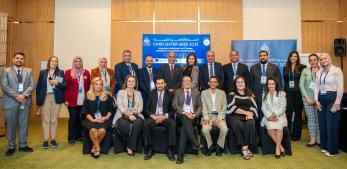Advancing water governance and resilience at Cairo Water Week 2025

At this year’s Cairo Water Week, Mercy corps and Blue Peace Middle East Initiative, along with regional leaders, policymakers, and technical experts convened in a joint session titled “Approaches to Converging Water-Climate Resilience from Regional to Local Levels.” The discussion explored how regional water diplomacy can align with local adaptation efforts to strengthen resilience across one of the world’s most water-stressed regions.
The joint session panel, moderated by Eng. Alaa Al Qaisi from the Swiss Agency for Development and Cooperation brought together a distinguished panel of voices: Nour Darwazeh, Policy, Research and Evidence Specialist at Mercy Corps Jordan, Eng. Zeina Majdalni from Blue Peace Middle East Initiative, Dr. Mutawakil Obeidat from the Water Diplomacy Center and Eng. Mufleh Al Alaween, Regional Water Diplomacy Advisor at the Swiss Embassy in Amman. Each speaker offered a complementary perspective on how to bridge regional, national, and community levels of action, demonstrating that effective resilience building requires collaboration across scales.
Putting people and policy at the center of water resilience
Jordan stands among the ten most water-scarce countries globally, with only 61 cubic meters of renewable water per person per year, far below the 500 cubic meters threshold that defines absolute water scarcity1. The challenge extends beyond limited supply. It is also about how decisions are made, how authority is shared, and whose voices shape the future of water governance.
Discussions at Cairo Water Week emphasized that solving the water crisis requires more than technical solutions, it demands governance that is transparent and equitable. Years of engagement and research in Jordan, have highlighted critical policy and institutional actions needed to advance water governance: i) Water policies must recognize ecosystems as legitimate users; ii) Decentralization is needed to give implementing level government bodies the authority and resources to manage water risks effectively; iii) Enforcement systems must be fair and consistent and iv) Most importantly, communities must have meaningful roles in identifying priorities and influencing the reforms that affect them.
“Resilience strategies can only succeed when they start and end with communities. Those living the realities of water scarcity and climate shocks know best what needs to change. Our role as practitioners and partners is to listen, amplify local voices, and ensure that this insight drives action from the community level up to national and regional scales.” — Nour Darwazeh, Mercy Corps Jordan
From local insight to regional cooperation
The conversations at Cairo Water Week echoed Mercy Corps’ broader reflections on Jordan’s water governance landscape, particularly the need to make inclusion a lived practice rather than a policy aspiration. Findings from the upcoming Water Policy Analysis, that will be published in November 2025, highlight that while national strategies increasingly reference participation and decentralization, genuine influence over decisions still remains concentrated at the central level. These lessons strongly resonated with the regional dialogue in Cairo, which emphasized that lasting resilience depends on embedding fairness, accountability, and shared ownership across all levels of governance.
Against this backdrop, Mercy Corps shared how experience from the Tabeaa project in Jordan can inform regional cooperation efforts. When communities are equipped with evidence, platforms for dialogue, and the ability to advocate for their needs, they evolve from recipients of services to active agents of change. This bottom-up approach is redefining resilience, ensuring that policy and practice are informed by lived experience and that regional water diplomacy remains anchored in the realities of the people it aims to serve.
Looking ahead: From evidence to action
Moving forward, Mercy Corps remains committed to advancing this vision by continuing to work with communities, governments at all levels, and regional partners to translate evidence into policy, strengthen inclusive governance systems, and scale community-driven solutions. Through the Tabeaa project and its partnerships, the organization will keep fostering spaces where local voices shape decisions, from households to aquifers, driving a more equitable and climate-resilient future for Jordan and the wider region.